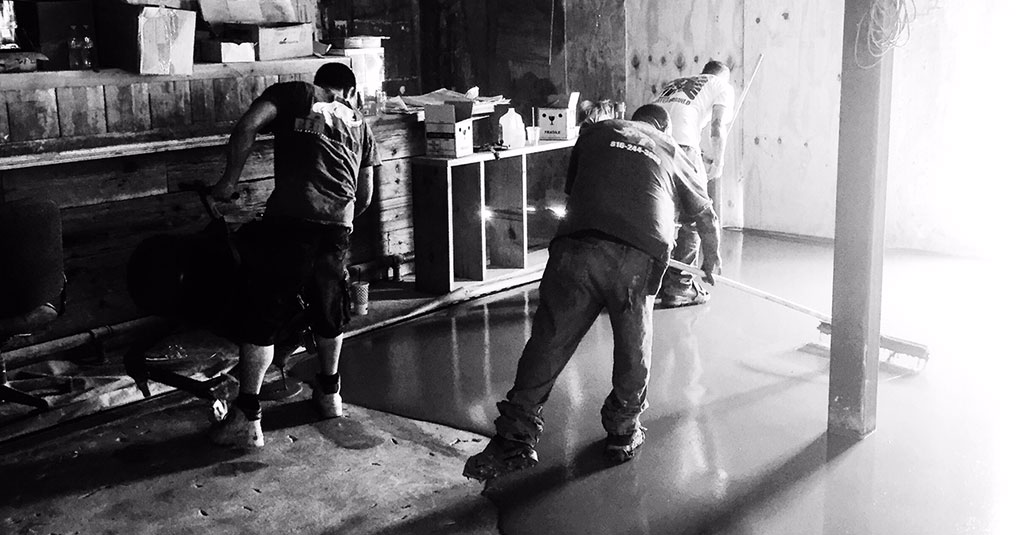
Epoxy Flooring: Not All Epoxy Floors are Created Equal
One thing that can confuse end-users is the price ranges epoxy contractors will provide when bidding on a job. How can there be such a vast discrepancy between pricing epoxy contractors provide when it comes to a flooring project?
The answer is simple – Not all epoxies are created equal, and neither are epoxy contractors. Here are the main factors that contribute to price fluctuations when it comes to epoxy flooring installations:
- Thickness of the Flooring System (Millage)
Epoxy flooring products can be applied at a large range of coverage rates. Typically, epoxy can be installed at 50 square feet per gallon (32-mils) all the way up to 300 square feet per gallon (5-mils). Think about that. One contractor may be offering a flooring system that is thick and durable, while another is offering a similar product but 6 times thinner. This is a method that many epoxy flooring contractors utilize in order to acquire a contract or sell a job. The problem with this is that a thin epoxy floor is destined for failure and will inevitably require repair and the honoring of the installation’s warranty. The whole point of installing a flooring system is to ensure proper product application and prevent the potential for warranty repair.
- Epoxy Product Intended for Use
All epoxies are manufactured differently. Some epoxy flooring products are water-based while others are solvent based. Of course, water-based epoxies are usually 50% cheaper than their alternatives. However, 100% solids epoxies are products that do not shrink when they dry. They are prized for maintaining the same level of thickness between the time they are applied and the time they have cured. These products are more expensive and offer the greatest durability and strength for epoxy flooring installations. When considering your upcoming flooring project, it is important to ensure that the proper epoxy flooring products are intended for use in your space.
- Epoxy Product Manufacturer
There are different Quality Assurance protocols for epoxy, urethane and polymer flooring manufacturers. Some manufacturers mass produce products for general sale to the public. These sorts of manufacturers are ones that are notorious for denying warranty claims, especially since their business model is focused on sales rather than quality installation. It is important to ensure that a reputable manufacturer, preferably based in the United States, is the supplier of the epoxy intended for use on your project. The highest-tier manufacturers that make premium grade epoxy flooring products always require their epoxy contractors to go through a rigorous training and certification process. Every 3-5 years the training and certification process must be refreshed in order for a contractor to retain their right to purchase and install the product. The main manufacturers that we are certified by are Laticrete, Koster, Arizona Polymers, General Polymers, NeoGard, Carboline, Florock, Tennant and Kelmar to name a few.
- Warranty Period
If you are looking for a long-term warranty, you will need your epoxy contractor to install a thicker floor. Typically, epoxy floors last a minimum of ten years in mild environments. In mild environments that are not exposed to severe impact and chemical exposure they can last up to 25-30 years. Depending on the environment of application, an extended warranty can be achieved with the application of a thicker, more durable epoxy floor.
- Surface Preparation Methods
The correct way to prepare a concrete surface for an epoxy flooring installation is to shot-blast, scarify and diamond grind the substrate with the proper tooling and machinery. Different epoxy products require different CSPs (Concrete Surface Profiles) in order to be applied appropriately, and these CSP ratings are achieved by the use of specific machinery and diamond-tooling. It is important to ensure that your epoxy contractor is utilizing all means available to achieve the proper CSP on your concrete slab prior to installing the product. You can verify the required CSP ratings on the epoxy product’s Technical Data Sheet.
All-in-all, it is important to ensure that your epoxy flooring project estimates are being compared “apples-to-apples.” Here is a quick checklist that can help you prepare for your upcoming flooring installation:
- Analyze the estimate provided by your contractor. Make sure it is very specific and detailed.
- Have your epoxy contractor provide you with Technical and Safety Data Sheets for the products.
- Analyze the Technical and Safety Data Sheets of your epoxy products.
- Verify that the epoxy products intended for use are produced by a reputable manufacturer.
- Ensure your epoxy contractor is certified and in good-standing with the product manufacturer.
- Verify that your epoxy contractor has the proper equipment and tooling for proper CSP achievement.
- Review the Warranty Package provided by your epoxy contractor and compare it to that of the product manufacturer.
At Blackrock Industrial, we take pride in our work and we love what we do. This is not a hobby for us. This is our passion. We are one of the few epoxy flooring contractors in Florida that are certified and supported by the industry’s leading product manufacturers. It is not our goal to sell jobs, but rather to provide flooring systems that perform and stand the test of time. We know that installing resinous flooring products properly is what keeps customers happy and prevents us all from having to deal with repairs or warranty issues down the road. Our goal is to continuously install products designed and formulated for each individual environment. We look forward to continuous relationships with our clients on upcoming projects, not on repeat projects.
Give us a call and speak to one of our installation specialists and learn how our epoxy flooring solutions can benefit your space. We are always available to help you in your decision-making process when it comes to resinous flooring and take pride in our ability to guide and consult our clients throughout their flooring project.


